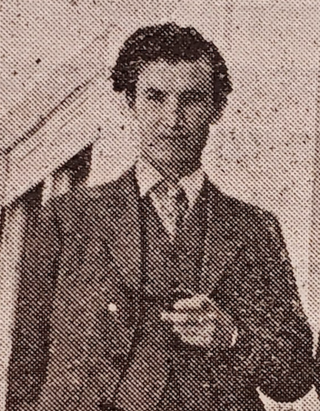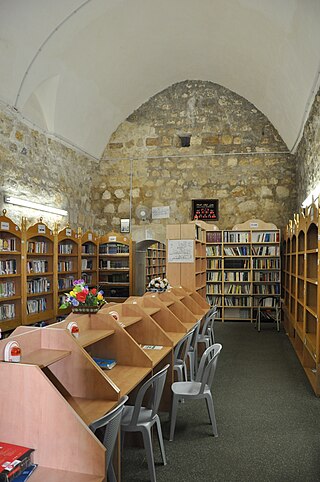Related Research Articles

Palestinians are an Arab ethnonational group native to Palestine.

Khirbat Jiddin, known in the Kingdom of Jerusalem as Judin, was an Ottoman fortress in the western Upper Galilee, originally built by the Teutonic Order after 1220 as a crusader castle, 16 km northeast of the city of Acre, which at the time was the capital of the Kingdom of Jerusalem. The castle was destroyed by the Mamluk sultan Baibars sometime between 1268-1271 and lay in ruins until being rebuilt and expanded by the Arab ruler Zahir al-Umar as Qal'at Jiddin in the 1760s, only to be destroyed again around 1775 by Jazzar Pasha. The ruined fortress, known as Khirbat Jiddin, was later inhabited by the al-Suwaytat Bedouin tribe.

Al-Manshiyya, was a Palestinian village with a Muslim orphanage and a mosque known as the mosque of Abu 'Atiyya, which is still standing.

Al-Damun, was a Palestinian Arab village located 11.5 kilometres (7.1 mi) from the city of Acre that was depopulated during 1948 Arab-Israeli war. In 1945, the village had 1,310 inhabitants, most of whom were Muslim and the remainder Christians. Al-Damun bordered the al-Na'amin River, which the village's inhabitants used as a source of irrigation and drinking water from installed wells.

Sa'sa' was a Palestinian village, located 12 kilometres northwest of Safed, that was depopulated by Israeli forces during the 1948 Arab-Israeli war. The village suffered two massacres committed by Haganah forces: one in mid-February 1948 and the other at the end of October the same year. Its place has been taken since 1949 by Sasa, an Israeli kibbutz.

Rashid Ismail Khalidi is a Palestinian-American historian of the Middle East and the Edward Said Professor of Modern Arab Studies at Columbia University. He served as editor of the Journal of Palestine Studies from 2002 until 2020, when he became co-editor with Sherene Seikaly.

Bani Khalid is an Arab tribal confederation mainly inhabiting the Arabian Peninsula. The tribe ruled southern Iraq, Kuwait, and Eastern Arabia from the 15th century to the 18th century, and again under the auspices of the Ottoman Empire during the early 19th century. At its greatest extent, the domain of Bani Khalid extended from Iraq in the north to the borders of Oman in the South, and Bani Khalid wielded political influence by ruling the region of Najd in central Arabia. Most of the tribe's members presently reside in eastern and central Saudi Arabia, while others live in Iraq, Kuwait, Qatar, Bahrain, Syria, Palestine, Lebanon and the United Arab Emirates. Bani Khalid has both Shia Muslim and Sunni Muslim members.

Walid Khalidi is a Palestinian historian who has written extensively on the Palestinian exodus. He is a co-founder of the Institute for Palestine Studies, established in Beirut in December 1963 as an independent research and publishing center focusing on the Palestine problem and the Arab–Israeli conflict, and was its general secretary until 2016.

Al-Jura was a Palestinian village that was depopulated during the 1948 Arab-Israeli war, located immediately adjacent to the towns of Ashkelon and the ruins of ancient Ascalon. In 1945, the village had a population of approximately 2,420 mostly Muslim inhabitants. Though defended by the Egyptian Army, al-Jura was nevertheless captured by Israel's Givati Brigade in a November 4, 1948, offensive as part of Operation Yoav.
The Palestinian people are an ethnonational group with family origins in the region of Palestine. Since 1964, they have been referred to as Palestinians, but before that they were usually referred to as Palestinian Arabs. During the period of the British Mandate, the term Palestinian was also used to describe the Jewish community living in Palestine.

Deir al-Dubban was a small Palestinian village 26 kilometers (16 mi) northwest of Hebron, near the modern village of Luzit, between Jerusalem, and Ashkelon. The village was ethnically cleansed in the 1948 Palestine War.

Muhammad 'Izzat Darwaza was a Palestinian politician, historian, and educator from Nablus. Early in his career, he worked as an Ottoman bureaucrat in Palestine and Lebanon. Darwaza had long been a sympathizer of Arab nationalism and became an activist of that cause following the Arab Revolt against the Ottoman Empire in 1916, joining the nationalist al-Fatat society. As such, he campaigned for the union of Greater Syria and vehemently opposed Zionism and foreign mandates in Arab lands. From 1922 to 1927, he served as an educator and as the principal at the an-Najah National School where he implemented a pro-Arab nationalist educational system, promoting the ideas of Arab independence and unity. Darwaza's particular brand of Arab nationalism was influenced by Islam and his beliefs in Arab unity and the oneness of Arabic culture.

Temple denial is the claim that the successive Temples in Jerusalem either did not exist or they did exist but were not constructed on the site of the Temple Mount, a claim which has been advanced by Islamic political leaders, religious figures, intellectuals, and authors.
Tarif Khalidi is a Palestinian historian who now holds the Shaykh Zayid Chair in Islamic and Arabic Studies at the American University of Beirut in Lebanon.

Mujīr al-Dīn al-ʿUlaymī, often simply Mujir al-Din, was a Jerusalemite qadi and historian whose principal work chronicled the history of Jerusalem and Hebron in the Middle Ages. Entitled al-Uns al-Jalil bi-tarikh al-Quds wal-Khalil, it is considered to be invaluable, constituting "the most comprehensive and detailed source for the history of Jerusalem" written in its time.
Najib Nassar was a Palestinian journalist perhaps best known as the owner-editor of, and frequent contributor to, the Palestinian weekly newspaper Al-Karmil. Historian Rashid Khalidi described him as "a pioneer among Palestinian and Arab journalists" due to "the sophistication and tenaciousness of his opposition to Zionism."
The Palestine Arab Congress was a series of congresses held by the Palestinian Arab population, organized by a nationwide network of local Muslim-Christian Associations, in the British Mandate of Palestine. Between 1919 and 1928, seven congresses were held in Jerusalem, Jaffa, Haifa and Nablus. Despite broad public support their executive committees were never officially recognised by the British, who claimed they were unrepresentative. After the British defeat of Ottoman forces in 1918, the British established military rule and (later) civil administration of Palestine. The Palestine Arab Congress and its organizers in the Muslim-Christian Associations were formed when the country's Arab population began coordinated opposition to British policies.
Al-Khaldi, also spelled Al Khalidi is the last name given to descendants of the Bani Khalid. The tribe traditionally claims descent from Khalid ibn al-Walid, a senior companion of the Islamic prophet Muhammad and esteemed general who was crucial in the Islamic Conquest of Persia and Syria. This claim has been questioned by Arab genealogists who have suggested that the tribe may descend from his relatives from Banu Makhzum and not from Khalid himself, alternatively, they have largely been attributed to. The tribe has historically been powerful in the Arabian Peninsula, having ruled Southern Iraq, Kuwait, and Eastern Arabia after expelling Ottoman and Portuguese forces in 1670. After their conflict and fall to the Emirate of Diriyah, many Khalidis scattered to Iraq and the Levant, where many of them remain to this day. The Khalidis were reinstated in power by the Ottomans after the deposition of the first Saudi State in the early 19th century, but the Saudis would quickly rise again and permanently remove them from power. Today the overwhelming majority of the descendants of the tribe live in Saudi Arabia as well as Kuwait, Qatar, Oman, Lebanon, Iraq, Jordan, and Palestine.

Palestinian nationalism is the national movement of the Palestinian people that espouses self-determination and sovereignty over the region of Palestine. Originally formed in the early 20th century in opposition to Zionism, Palestinian nationalism later internationalized and attached itself to other ideologies; it has thus rejected the occupation of the Palestinian territories by the government of Israel since the 1967 Six-Day War. Palestinian nationalists often draw upon broader political traditions in their ideology, such as Arab socialism and ethnic nationalism in the context of Muslim religious nationalism. Related beliefs have shaped the government of Palestine and continue to do so.

The al-Aqsa Library, also known as the al-Aqsa Mosque Library, is the assemblage of books in the Al-Aqsa mosque compound in Jerusalem.
References
- ↑ Pappé, Ilan (2017). The rise and fall of a palestinian dynasty ; the Husaynis 1700-1948. Saqi Books. ISBN 978-0-86356-453-6. OCLC 1026169394.
- ↑ Anani, Yazid. "Al-Atlal: Ruins and Recollections." Jerusalem Quarterly 69 (Spring 2017): 5.
- ↑ Phillips, Jonathan (2019-04-25). The Life and Legend of the Sultan Saladin. Random House. ISBN 978-1-4481-2968-3.
- ↑ "Domes of Haram al-Sharif - Madain Project (en)". madainproject.com. Retrieved 2022-04-23.
- ↑ Khalidi, Rashid (2010). Palestinian Identity. Columbia University Press. p. 30. ISBN 978-0-231-52174-1. OCLC 1002099098.